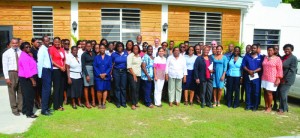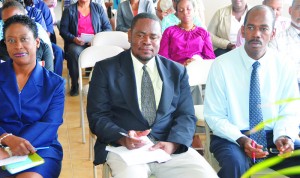

A one-day workshop in Anguilla on Tuesday this week focused on various matters related to protecting the island’s children from abuse, violence and other social ills. Called the Interagency Child Protection Protocol Consultation Workshop, the event, at Masara Resort, was organised by the Ministry and Department of Social Development with the involvement of UNICEF and Dr. Glenford Howe, a leading Caribbean professional as the Consultant.
Commissioner of Social Development, Sanford Richardson, who chaired the opening ceremony, described the workshop as timely and invaluable for the protection of the island’s children.
The workshop was declared open by Permanent Secretary in the Ministry of Social Development, Dr. Bonnie Richardson-Lake. “Children are among our precious resources and they must be protected,” she said. “UNICEF defines child protection as strengthening a country’s environment, capacities and response, to prevent and protect children from violence, exploitation, abuse and neglect.”
She stressed that child protection was not limited to parents and families, but required the commitment of a wide cross-section of national actors. She said that, since last year, the Ministry of Social Development had been working with UNICEF, in the person of Dr.Glenford Howe, to develop a formal systematic process for reporting child abuse in Anguilla.
“A very comprehensive draft has been developed and we are very thankful to Dr. Howe,” the Permanent Secretary stated. “The document aims to incorporate practices that are in the best interest of the child – and all operations in the social sector – as a strategy to ensure that child protection matters are addressed in a standardised, professional manner. It also seeks to produce a Child Protection Protocolfor key agencies and stakeholders to use as a framework to guide operations around child protection…The protocol also seeks to determine the legislative gaps and identify the necessary legislative changes for adequate protection of children; and to maximise a Child Protection Protocol in the future. Finally, it promotes recognition of children as a vulnerable group for which robust social protection and social justice systems must be in place.”
She urged the workshop participants, who included teachers and social workers, to offer any suggestions they might have to strengthen the protocol.
Social Development Planner, Mrs KieshaGumbs-Bibby, said a Child Protection Steering Committee was formed in 2004 under the auspices of the Foreign and Commonwealth Office Child Protection Programme through the Department for International Development. The aim was to safeguard children in the Overseas Territories. After a period of three years, however, that project was discontinued and from 2012 to the present, UNICEF has been sponsoring what is now known as “Safeguarding Children in Anguilla”. She said that the workshop was aimed at finalising the Interagency Child Protection Protocol for professional use in safeguarding children on the island.
Ms Heather Stewart, a Child Protection Specialist with UNICEF, said that the consultation workshop was a response to one of the critical issues confronting children in Anguilla as well as those in the region. “In November 2012, your Government, together with fellow CARICOM member states, discussed this issue at a ministerial meeting,” she recalled. “They pledged concerted efforts to prevent…children’s abuse. We are very pleased that Anguilla is at this point in finalising its National Child Abuse Prevention and Reporting Protocol because, for us, this signals that your Government fully recognises the strong linkages between policy[matters] and children’s rights – and that they are essential to economic development and productivity gains in your country.”
She hoped that the workshop would put Anguilla well on its way to finalising the island’s Interagency Child Protection Protocol.







